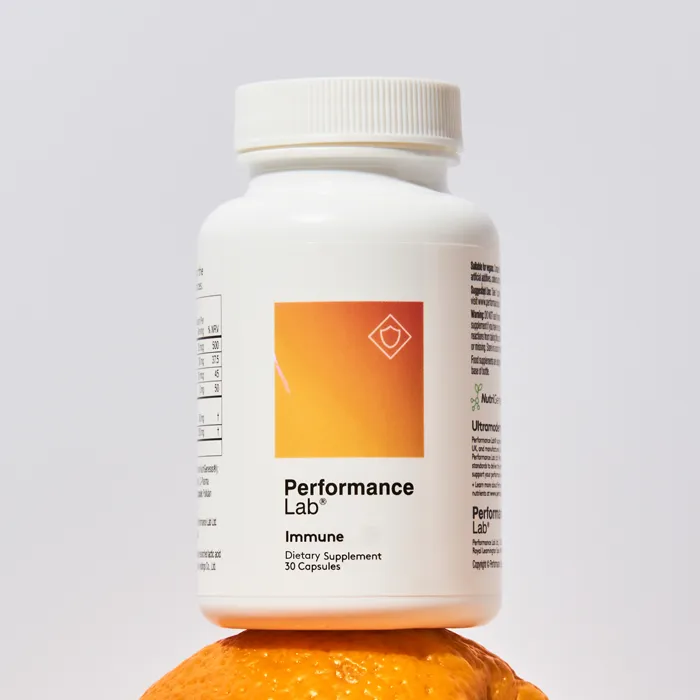We all know exercise is important. Whether it’s walking, running, cycling, CrossFit, powerlifting, yoga, or whatever form of physical activity you enjoy, there’s an endless list of benefits for health and well-being.
But perhaps one of the lesser-known—but still big—benefits of daily movement is for immune function.
Generally speaking, we think about things like stress, sleep, diet, and supplements for keeping the immune system strong and healthy, but exercise also plays a prominent role.
Whether you are or aren’t aware of the relationship between exercise and immune function, we’re breaking it down for you.
We’re covering the basics of what you need to know about exercise—why it’s important for overall health, how it’s connected to immune function, and the best type of exercise food boosting the immune system.
Key Takeaways
- Regular physical activity improves overall health markers like body composition, mood, and cardiovascular function, which all support a stronger immune system.
- Moderate bouts of exercise (generally less than 60 minutes) enhance immunosurveillance by temporarily increasing circulation of key immune cells.
- Over time, repeated moderate workouts help lower chronic inflammation and reduce the risk of many lifestyle-related diseases.
- Excessive, high-volume training without adequate recovery can temporarily impair immune function, so balancing intensity, duration, and rest is critical.

Why Is Regular Exercise Important?
Being physically active is an important part of a healthy lifestyle. There are no shortage of studies linking regular exercise to better mental and physical health, some of which include:
- Weight management
- Cardiovascular health
- Better mood and mental health
- Muscle mass maintenance
- Bone health
- More energy
- Better lipid profile
- Less inflammation and oxidative stress
- Improved brain health and memory
- Pain reduction
- Improved sleep
All of these add up to better overall health and well-being. But there’s also another important benefit to regular physical activity; exercise doesn’t just strengthen your muscles; it also plays a role in strengthening your immune system.
How Exercise Affects The Immune System
The immune system is far from simple. It’s a complex and highly intricate network of cells and molecules designed to maintain health and prevent the infiltration of pathogenic bacteria that cause illness and infection.
And although several external factors influence immune function, the link between exercise and the immune system is pretty strong.
Like we said before, several factors influence the function of the immune system, but the immune system appears to be very responsive to exercise.
The acute immune response to exercise depends on the intensity and duration of effort 1; moderate exercise is defined as anything below 60% VO2 and less than 60 minutes, whereas vigorous exercise is above 60% VO2 and greater than 60 minutes.
One of the most obvious effects of moderate-intensity exercise bouts lasting less than 60 minutes on immune function is enhanced immunosurveillance.
Studies show that moderate- and vigorous-intensity aerobic exercise less than 60 minutes in duration can increase antipathogen activity of tissue macrophages along with recirculation of other immune cells, including:
- Immunoglobulins
- Anti-inflammatory cytokines
- Neutrophils
- NK cells
- Cytotoxic T cells
- Immature B cells
These cells play critical roles in immune defense activity and metabolic health. But what’s interesting is that acute bouts of exercise appear to preferentially mobilize NK cells and CD8+ T lymphocytes that exhibit high cytotoxicity and the ability to migrate to various tissues.
Long-term, these transient increases in selective immune cells work to enhance immunosurveillance and reduce levels of inflammation, which contributes to a stronger immune system and better overall health 2.
Several studies show that acute exercise is an immune system adjuvant that works to enhance defense activity and metabolic health, as well as reduce the risk of chronic illness. It’s also been shown to elicit an anti-inflammatory effect mediated through multiple pathways 1.
Moderate intensity exercise may induce small, acute increases in IL-6 and IL-10 that exert direct anti-inflammatory effects, thereby improving glucose and lipid metabolism over time, which may result in improvements in metabolic health and body composition 3, 4.
Exercise And Inflammation
One of the other significant benefits of exercise is on levels of inflammation. Studies show that every exercise bout causes transient increases in total white blood cells, granulocyte-related proteins, and a variety of plasma cytokines, including interleukin-6 (IL-6), IL-8, IL-10, IL-18, IL-1 receptor antagonist (IL-1ra), granulocyte colony-stimulating factor, and monocyte chemoattractant protein 5, 6; the magnitude of increases, however, is reflective of the overall exercise workload. Heavy exertion also causes increases in acute phase proteins like C-reactive protein (CRP).
But what’s interesting is that despite levels of inflammation being higher during intense exercise, individuals who regularly exercise actually have lower resting levels of inflammatory markers than people who are overweight and sedentary 1.
As such, there’s increasing evidence suggesting that regular exercise training has an overall anti-inflammatory influence mediated by various pathways, including better control of inflammatory signaling pathways, the release of muscle myokines that stimulate the production of IL-1ra and IL-10, decreased dysfunctional adipose tissue, improved oxygenation, enhanced innate immune function, and an improved balance of oxylipins.
The reason why inflammatory status is so critical to health is because chronic or systemic inflammation has been linked to several diseases such as obesity, arthritis, atherosclerosis and cardiovascular disease, chronic kidney disease, liver disease, metabolic syndrome, insulin resistance, type 2 diabetes, sarcopenia (muscle loss), arthritis, osteoporosis, COPD, cognitive decline, depression, and certain types of cancers 1.
Exercise And Gut Microbiota
For most people, the gut is for food; it breaks down and absorbs nutrients to fuel good health. But a lot of people don’t know that more than 70% of the immune system resides in the gut, which means that if the gut is unhealthy and imbalanced, immune function is going to be compromised.
The diversity and composition of gut bacteria is influenced by several factors, including diet, age, gender, genetics, ethnicity, antibiotics, health, disease, and exercise.
Although a lot of research is still emerging about the link between physical activity and the microbiome, studies suggest that regular exercise and physical fitness increase the diversity of the gut microbiota and enhances the number of benign microbial communities 7, 8. Better gut health means a healthier, stronger, and more effective immune function.
Best Exercises For Better Immune Function
Based on research, it’s pretty clear that acute bouts of exercise (moderate-to-vigorous intensity) lasting less than 60 minutes is important for supporting a strong immune system response by stimulating the ongoing exchange of distinct and highly active immune cells between circulation and tissues 1.
When exercise occurs daily, the acute changes in immune activity work to enhance immune defense activity and overall metabolic health.
However, many people go wrong because they think the more they exercise, the stronger their immune system will be—and it’s actually the opposite.
High exercise training loads, competitions, and the associated physiological, metabolic, and psychological stress have been associated with transient immune perturbations, inflammation, increased oxidative stress, muscle damage, and an increased risk of illness 1.
Studies actually show that athletes who are competing and going through repeated cycles of unusually heavy exertion and other stresses have impaired immune function.
This may be due to increased stress hormone release and pro-inflammatory cytokines that actually suppress immune function rather than enhance it; these do not appear to increase with moderate intensity bouts of exercise lasting less than 40 minutes 9.
Research also suggests that changes in immune activity occur in several compartments of the immune system and body, including the skin, upper respiratory tract mucosal tissue, lungs, blood, muscle, and peritoneal cavity 1.
Although there is some research arguing the link between heavy exertion and transient immune dysfunction, the overall consensus is that function of the immune system reflects the magnitude of physiological stress experienced by the exerciser.
Final Thoughts
Long story short, you can’t go wrong with adding in physical activity to your day if you’re looking to boost immune function.
Whether it’s a power walk, weight lifting session, swim, or bike ride, getting active keeps the immune system and the entire body healthy and functioning at peak performance.
References
- DC Nieman, LM The compelling link between physical activity and the body’s defense system. J Sport Health Sci. 2019;8(3):201-217.
- JL Viana, GC Kosmadakis, EL Watson, et al. Evidence for anti-inflammatory effects of exercise in CKD.J Am Soc Nephrol. 2014;25(9):2121-2130.
- K Karstoft, BK Pedersen. Exercise and type 2 diabetes: focus on metabolism and inflammation.Immunol Cell Biol. 2016;94(2):146-150.
- BK Pedersen. Anti-inflammatory effects of exercise: role in diabetes and cardiovascular disease. Eur J Clin Invest. 2017;47(8):600-611.
- DC Nieman, AJ Groen, A Pugachev, G Detection of Functional Overreaching in Endurance Athletes Using Proteomics.Proteomes. 2018;6(3):33.
- JM Peake, P Della Gatta, K Suzuki, DC Nieman. Cytokine expression and secretion by skeletal muscle cells: regulatory mechanisms and exercise effects.Exerc Immunol Rev. 2015;21:8-25.
- M Estaki, J Pither, P Baumeister, et al. Cardiorespiratory fitness as a predictor of intestinal microbial diversity and distinct metagenomic functions. 2016;4(1):42.
- W Barton, NC Penney, O Cronin, et al. The microbiome of professional athletes differs from that of more sedentary subjects in composition and particularly at the functional metabolic level. 2018;67(4):625-633.
- DC Nieman, DA Henson, MD Austin, VA Brown. Immune response to a 30-minute walk. Med Sci Sports Exerc. 2005;37(1):57-62.
















